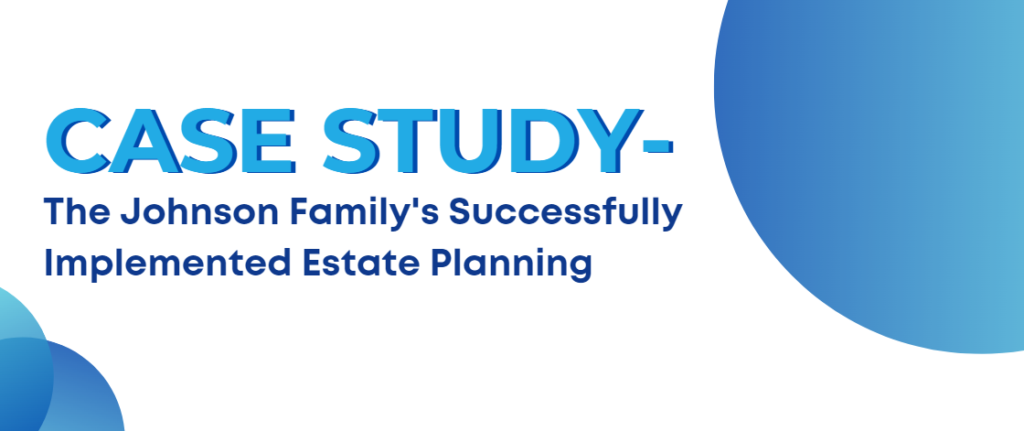
Estate planning is the process of arranging for the transfer of an individual’s assets and properties after death in a way that complies with their preferences while minimizing taxes and legal problems.
Estate planning is important because it helps ensure that an individual’s assets and properties are distributed according to their wishes and that their loved ones are cared for after their passing. It can also help minimize taxes and legal complications, saving the beneficiaries time and money. Without proper estate planning, the distribution of assets may be subject to state laws, which may not align with the individual’s wishes and can cause unnecessary stress for the family members left behind.
In this blog, we will explore the importance of estate planning and the various strategies that can be used to protect and transfer wealth to future generations. We will delve into the tax implications associated with estate planning and discuss how individuals can minimize taxes and legal complications. Additionally, we will examine a real-life case study of successful estate planning implementation, highlighting the key lessons learned from this experience. By the end of this blog, you will better understand the power of estate planning and how it can help ensure that your assets are distributed according to your wishes while minimizing taxes and legal complications for your loved ones. So, let’s dive in!
Let us first see the strategies to conserve and transmit riches to future generations.

Ways to Protect and Transfer Wealth to the Future Generation
Estate planning entails passing wealth to the next generation and safeguarding it for their future benefit. Following are some points to consider while protecting and transferring wealth to future generations:
- Have a Will or Trust for Wealth Transfer- Make a will or a trust to specify how you want your possessions transferred after your death. According to a caring.com poll, just 32% of American adults have a will or other estate planning paperwork in place.
- Transfer Assets to Reduce Taxable Estate- Consider transferring assets to your children or grandkids throughout your lifetime to decrease your taxable estate. The gift tax exclusion level for 2021 is $11.7 million per individual, which means you can donate up to this amount without incurring gift taxes.
- Get Life Insurance- Life insurance offers financial security for your loved ones after you die. Life insurance can give tax-free income to your beneficiaries, and the death benefit usually is not taxable.
- Use Estate Planning Mechanisms- Use estate planning mechanisms such as limited family partnerships or charitable trusts to transmit money to future generations while minimizing taxes.
- Consider Family-Limited Partnerships- A family-limited partnership can secure assets and transmit money to future generations while lowering estate and gift taxes. In 2021, the yearly gift tax exemption for transfers to family members through a family limited partnership was $15,000 per beneficiary.
- Seek Professional Advice- Consult with a financial advisor or an estate planning attorney to ensure your plans are legally sound and correspond with your overall financial goals.
While estate planning can help protect and transfer wealth to future generations, it’s essential to be aware of the various tax implications that can arise in the process. So let’s talk about them in the next part.

Various Tax Implications Associated with Estate Planning
Following are some points to keep in mind regarding the tax implications of estate planning:
- Estate Taxes- If the estate’s value exceeds specific criteria, estate taxes may apply to the transfer of assets after death. The federal estate tax exemption limit is $11.7 million per person, while several jurisdictions have lower estate tax thresholds.
- Gift Taxes- Gift taxes may be imposed on lifetime gifts over the yearly gift tax exclusion threshold. The yearly gift tax exclusion level is $15,000 per recipient. However, some types of donations, such as those provided for medical or educational purposes, are exempt.
- Income Taxes- When certain assets, such as retirement accounts or investment properties, are transferred to heirs, income taxes may be owed.
- Capital Gains Taxes- When assets are sold, capital gains taxes may be required, reducing the estate’s overall worth. Capital gains taxes can be avoided or reduced by employing tactics such as stepped-up basis or charitable contributions. The top federal income tax rate on long-term capital gains and qualifying dividends is 20%.
Proper estate planning can assist in reducing these taxes and guarantee that more assets are handed down to future generations. Understanding the numerous tax consequences involved with estate planning is critical for successful implementation, as seen in the following case study of a well-executed estate plan.
If you need some ideas about what to read next, here they are:
- Active v/s Passive Investing: Which Strategy Fits Your Investment Goals?
- The Rise of Sustainable Investing: How Investors are Using Their Capital to Drive Positive Environmental, Social, and Governance Outcomes?
- Analyzing the Changing Landscape of Stock Market Regulation: The Impact of Evolving Government Policies and Regulations on the Investment Industry
- Credit Suisse Shares Plunge 5% As ‘Material Weaknesses’ Detected in Financial Reporting

Case Study~ The Johnson Family’s Successfully Implemented Estate Planning
The Johnson family had been in the business of manufacturing construction materials for over three generations. With each passing year, their wealth grew, and they became increasingly concerned about preserving their assets for future generations. They consulted an estate planner and developed a strategy for setting up a family limited partnership and a charitable foundation.
The family limited partnership allowed the Johnsons to transfer their business assets to their children and grandchildren without incurring estate or gift taxes. This helped reduce their taxable estate by approximately $5 million, which allowed them to pass on more of their wealth to their heirs.
Additionally, the Johnsons set up a charitable foundation, allowing them to make significant philanthropic contributions while receiving tax benefits. By donating a portion of their wealth to the foundation, the Johnsons were able to reduce their taxable income, which saved them approximately $1.5 million in taxes.
Overall, the Johnsons’ estate plan was successful in protecting and transferring their wealth to future generations. By implementing these strategies, they were able to reduce their estate and gift taxes while also making a positive impact on their community through their charitable contributions.
Thus, Johnsons is a classic example of a successfully implemented estate planning strategy. In the final section, let us look at another alternative that is also helping its clientele have a long-lasting legacy.
The Bottom Line
Estate planning ensures that an individual’s assets and properties are distributed according to their wishes while minimizing taxes and legal complications for their loved ones. Strategies for protecting and transferring wealth to future generations include making a will or trust, transferring assets during one’s lifetime to reduce the taxable estate, using estate planning mechanisms such as family partnerships or charitable trusts, and seeking professional advice. Understanding the various tax implications of estate planning is essential, including estate taxes, gift taxes, income taxes, and capital gains taxes. Proper estate planning can reduce these taxes and ensure more assets are passed down to future generations. A successful estate planning case study is presented, where the Johnson family used a family limited partnership and a charitable foundation to reduce their estate and gift taxes while also making a positive impact on their community through their charitable contributions.
Join Our Newsletter
Elevate your financial game & join the ranks of elite investors with Secvolt’s exclusive newsletter.
Join Our Newsletter
Elevate your financial game & join the ranks of elite investors with Secvolt’s exclusive newsletter.
Don’t just dream of wealth; achieve it with Secvolt. Schedule a call today for personalized guidance on your investment strategy and join the ultra-successful.
Ready to unlock your wealth’s truest potential & cherish affluence?
Secvolt, our hedge fund, sets the bar high with a record-breaking performance of 262% returns in 2022. With the brilliance of our highly advanced quant models and the efficiency of our risk mitigation protocols, we are yet to see a loss!
We’re the perfect ally to help you succeed financially and build the lasting legacy you have always aspired for.
Get in touch today. YOUR LEGACY AWAITS YOU…





